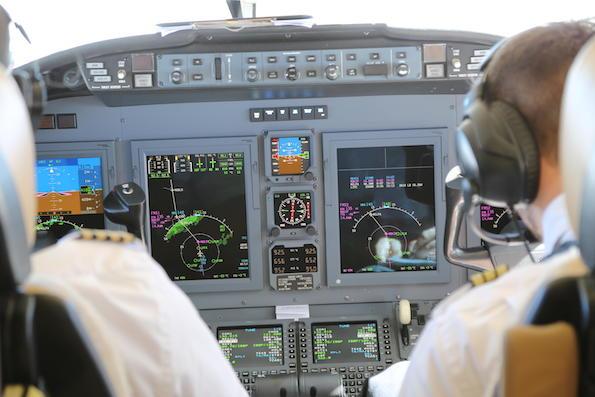
Research has shown that people will not reach out if they cannot do it anonymously, Peter Whitten, OdiliaClark sales director, told Aviation Week Network ShowNews at EBACE 2024.
GENEVA—With physical injuries or illness, seeking medical attention early often leads to better outcomes later. It is the same for mental health issues, but in aviation, there is often a reluctance to seek help.
Enter MedAire’s new peer support initiative called MedAire Wellbeing Services designed for business aviation. In collaboration with OdiliaClark, business aviation flight crews, mechanics, dispatchers and others may turn to peer support services designed to meet their unique challenges— and to do it in a safe place.
Airlines have long offered their flight crews support with mental health issues, which can be accessed anonymously. The smaller scale of business aviation, however, makes it more difficult to seek that support anonymously.
“When we entered the market in 2018, these programs existed at large airlines,” Peter Whitten, OdiliaClark sales director, told Aviation Week Network ShowNews at MedAire’s exhibit during the European Business Aviation Conference and Exhibition (EBACE 2024) here. “When you’ve got 15,000 pilots, you can create anonymity in that group. When you’ve got 15 pilots, it’s quite hard to do that.”
Research has shown that people will not reach out if they cannot do it anonymously, Whitten said.
With the program, “you can speak to someone who knows what your job is like, knows the stresses you have, knows that life you live,” he noted. But you will not run into the person you spoke with on a trip the next day or in the crew room.
“It could be really low-level stuff,” Whitten said. “They want to have a conversation with someone in a safe place and be able to express how they’re feeling and be listened to and be given some sort of well-being advice. We want to get to those people early.”
Whitten speaks from experience. In a hotel room in India one day after a trip, his phone rang. It was his mother, “which was odd because she was in New Zealand with my sister,” he said. “I answered the phone, and she said, 'Dad’s been hit by a car and killed.'”
Whitten, a pilot, knocked on his captain’s door. “[The captain] said, ‘Have you heard about our peer support program?’”
He had not. “I got in touch with a peer support volunteer the next day, and I talked to him,” Whitten said. “I didn’t really talk. I sat on the floor and cried for 45 min. because that’s what I needed. And that was the start of a journey for me. . . . It was so valuable at that time to have someone I could speak to who was outside my normal network, who I could just be honest with . . . and have that personal outlet. For me, that is powerful.”
Post-COVID-19, the need for emotional support services has grown. MedAire has seen how a number of its airline customers have enabled their peer support programs to grow successfully.
“And then, I came across Peter’s organization and realized that there was an opportunity to expand our offering to our clients in a way that provided a peer support equivalent to the business aviation community,” MedAire Worldwide CEO Bill Dolny said.
MedAire has been a safe place for its customers to go for medical issues for many years, he said. “We’re an easy kind of triage unit to help give them access to professionals.” In the case of mental well-being, the peer support services can validate that what the individual is going through is normal or they may advise the person to take an additional step and seek the help of a professional.
Peer support volunteers are current or former aviation professionals who have undergone specialized “best-in-class” training, which includes empathy, active listening and resilience-building to help give the appropriate support.
“This service promises an understanding and relevant support system, crucial for accessible and reliable mental health assistance,” MedAire said.
About 85-90% of the peer support calls to OdiliaClark do not go beyond the help of a peer volunteer, Whitten said, because the callers just needed to talk. “The remainder are offered the proper pathways to receive additional support,” he added.
The timing aligns with the FAA’s Mental Health & Aviation Medical Clearances Aviation Rulemaking Committee’s recent deliberations on mental health in aviation, which highlighted the need for peer support enhancements beyond traditional employee assistance programs.
“We just want to create a mechanism so people aren’t by themselves dealing with something and not talking to anybody about it,” Dolny said. “All of us in this industry want to make sure that person has an avenue to safely go through that process and determine if they should seek professional help or not.”
MedAire and OdiliaClark are also seeking volunteers. “If you’re somebody that wants to look into this, then we’d really encourage you to raise your hand,” Dolny said. “We’re trying to grow that population.”





